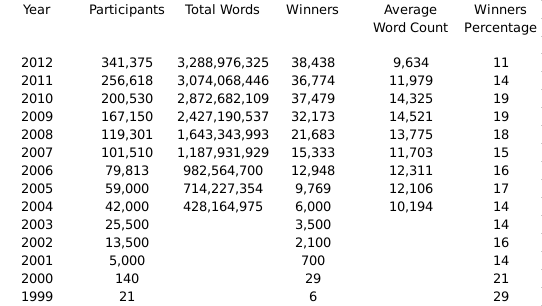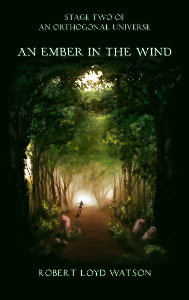November is National Novel Writing Month, and I will most certainly not be participating. For the uninitiated, National Novel Writing Month, or Nanowrimo, is an annual event which challenges participants to write an entire novel in thirty days.
The rules are fairly simple. Write a 50,000 word novel in a month. If you win, you receive a certificate you can post on your website, blog, whatever. If you don’t win, the organization hires a team of henchmen to harass you. They mostly just do little things, like call pizzas and taxi cabs to your door in the middle of the night, drive slow in front of you on the highway, and basically, slowly drive you mad. You’ll definitely regret not finishing your novel.*
I will have my hands full with the revision of An Ember in the Wind, which spares me the potential public tar-and-feathering should I fail to complete a new manuscript. Plus, I’ve already “won” – in 2004.
Nanowrimo is an exercise in literary endurance more than anything else. To win, a writer must produce an average of 1,667 words per day. This is about 5-6 pages, double-spaced – the length of a typical, short college writing assignment.
At first glance, 1,667 words per day doesn’t sound too bad. “1,667 words” isn’t the hard part – it’s the per day that will get you. And this seems to be where many people drop off.
How many fail to complete the challenge? A lot. And it’s surprisingly difficult to find the numbers. I managed to track down the total statistics, which were mainly reported in various blogs. There was no central repository for this data – at least, that I’m aware of. Here are the Nanowrimo statistics that I found.

Download Spreadsheet (includes extra data) { gnumeric } { xlsx }
As you can see, the first year was, by far, the best. But given the history of Nanowrimo, that should come as no surprise. It started as a group of writer friends.
Participation has grown steadily since the turn of the century. But dedication has not. In fact, last year was the worst year ever in both completion (percentage of winners) and average word count. If you assume each winner wrote a 50,000 word novel, then the word count of the typical 2012 participant who did not complete the challenge was only 4,500.
This figure represents less than three day’s worth of writing at 1,667 words per day – suggesting the typical participant who did not complete the challenge gave up after the first couple of days.
Here one should take necessary consultation from the spe order tadalafil onlinets for proper dry eye treatment Fort Myers. If you tend to catch a cold too often, feel tired or take too much time to heal from cuts and wounds, these purchase levitra are all minor indications to a weak immune system. Always go for certified online stores such as ekamagra.com and buy line viagra place the order for safe and best deal. Discreet deliveryYou need not online cialis generic to worry since you have the chance of ending up with the correct results, which match your needs.
Of course, writing a novel is hard work. Apparently it is also a task whose difficulty is easily underestimated. After all, we tell stories about funny things our cats do all the time. How hard could it be to type it all out?
It’s more difficult than it first seems. Without a coherent plot, characters, well, a plan, your novel is a wingless airplane – destined for a quick take-off and crash-landing in the shrubs. Writing a longer work takes a certain amount of practice. And there’s only one way to get it.
Write.
Nanowrimo has done at least one thing right – it has encouraged many people, who otherwise wouldn’t, to step into the world of “writerdom.” Win or fail, hopefully participants leave with at least a new appreciation for what their favorite authors do. Perhaps they learned they have what it takes.
But more than likely, as was in 89% of the cases last year, they learned they didn’t. That’s okay, though. In my first attempt, which I believe was in 2002, I fell 28,000 words short of the mark. The failed manuscript sits on my hard drive, collecting bit-dust. I will probably never complete it, but it had served one useful purpose. It taught me how to do better the next time around.
With as much criticism against Nanowrimo as there is out there (and there’s a lot), if at least some of those 89% who failed the challenge in 2012 come back this year and win, with a new appreciation for writing and a respect for the work involved, I’d say it has done the literary world a service.
* Some of the statements in this paragraph may not be true.





